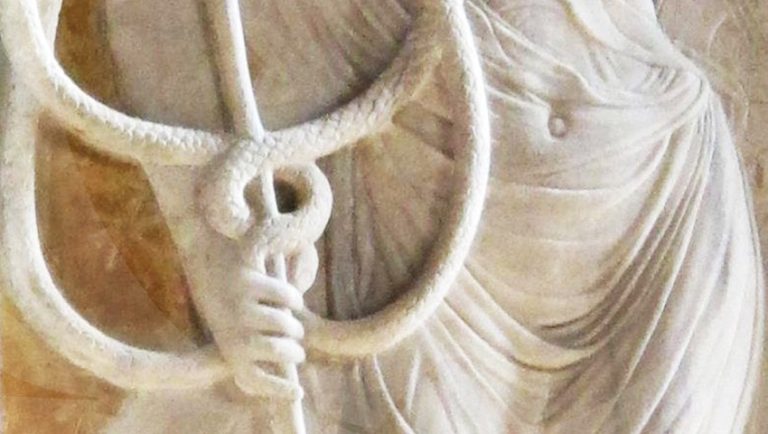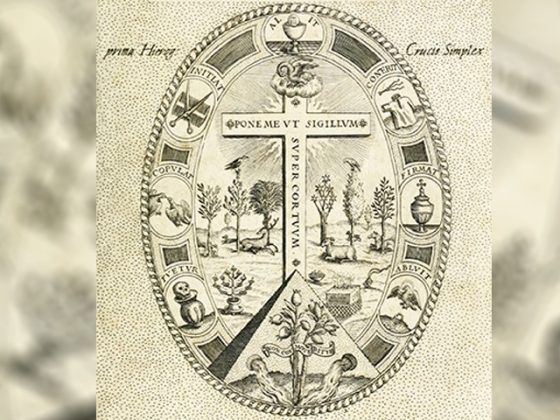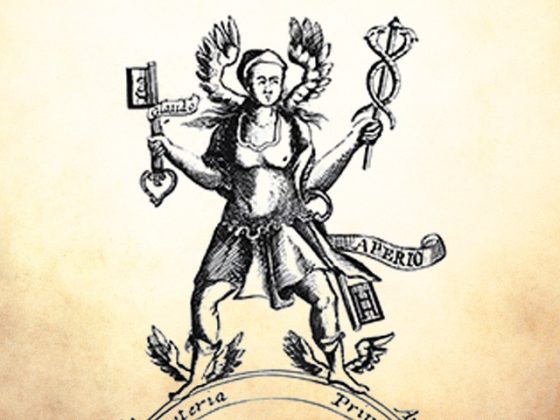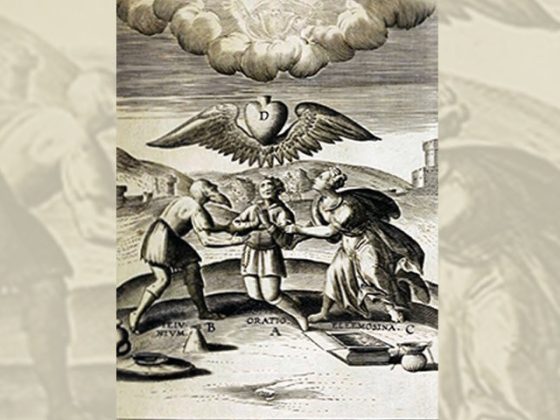Queridos amigos/as lectores/as:
I am sending you this image of the God Mercury, bas-relief in the Chapel of the Zodiac of the Malatestian Temple in Rimini, Italy. The author is the Italian sculptor Agostino di Duccio (1418-1481).
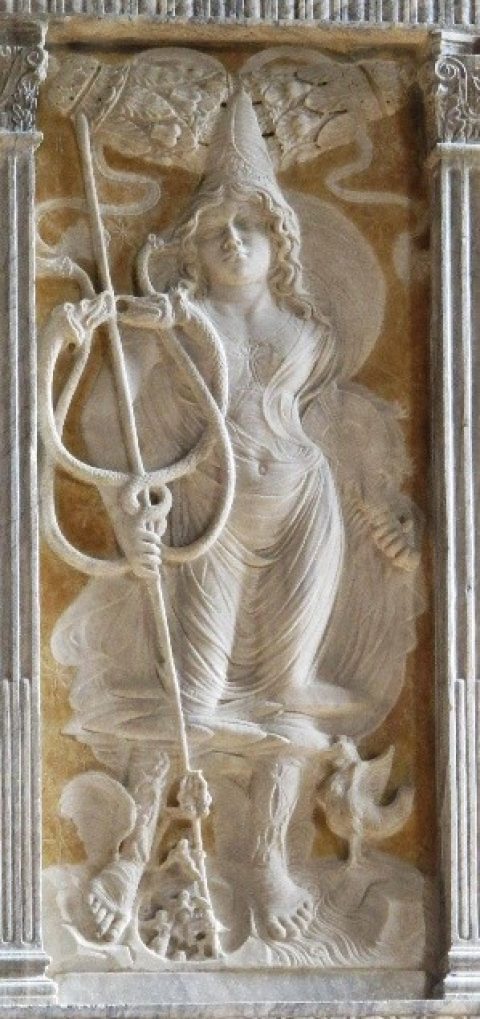
The representation of the God Mercury as androgynous caught our attention and, looking for information about it, we have found the comment attributed to Elemire Zolla (1926-2002), an Italian essayist, literary critic and philosopher who, according to his biographers, was knowledgeable about esoteric doctrines and a scholar of Western and Eastern mysticism.
Here are his comments:
“Agostino di Duccio's Mercury appears to us at the height of its power. The details of this image must have been suggested by the Hermeticists who had gathered at the court of Sigismund Malatesta. The stars in the background allude to the harmony of the spheres; the magic staff guides souls in the descent and ascent from the depths of the earth; the guard rooster is perched near the left foot; the conical hat of magic rises to the sky above the androgyne's head. The right foot, masculine, rests on the rock with which it is possible to light the fire, while the left foot, feminine, is immersed in the feminine waters; clouds float around his knees; in one hand he holds the caduceus and in the other the lyre.”
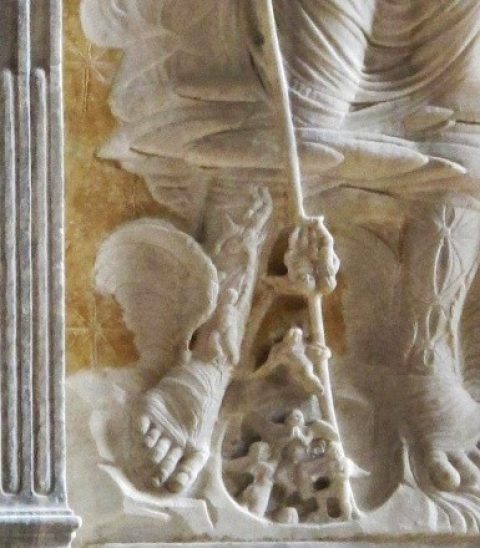
We all know, through Gnosis, that, certainly, MERCURY is the messenger between the Gods and men because it is, Gnostically speaking, a volatile matter ─transmutable─, it allows us to awaken Consciousness and by means of this phenomenon we can know the world of the superior and inferior spheres.
Many Hermetic fraternities have always associated the rooster with this mercurial element, precisely because, it being the rooster who awakens us at dawn, so does Mercury, when transmuted through the ARCANUM A.Z.F., allow us to awaken in the superior dimensions of space, creating in us the AURORA OF THE AWAKENING OF OUR CONSCIOUSNESS; that is why it is our means of communicating with the divine hierarchies in creation.
Mercury is the one who reconciles the two serpents that allegorize the channels IDA AND PINGALA of the Hindustani doctrine, and which bring to our brain the ENS-SEMINIS transmuted through the SAHAJA MAITHUNA or TANTRIC SEXUAL MAGIC. All this is taught to us in a didactic and dialectical way by the sacred Gnosis of all times…..
We must also note that through the staff of the Caduceus of Mercury souls go up and down. Why do they go up and down? Well, certainly, those people who lose their Mercury through masturbations and fornications, instead of ascending to the elevated spheres, they descend to the depths of the earth, to the Dantesque circles, to experience there for thousands of years what we gnostically call “SUBMERGED INVOLUTION OF THE INFERNAL WORLDS.”
As for the rooster [Spanish gallo], its name leads us to the word GAIO, which becomes the mantra of TANTRIC Alchemy par excellence: I-A-O.
It is interesting to see a foot ─masculine─ and another foot ─feminine─ as extremities of this divinity, because in reality MERCURY is a NEUTRAL energy, that is, it is present in feminine sexuality and in masculine sexuality. That is why, in the union of both polarities ─masculine and feminine─ through the sacrament of love, it is possible to be assisted by this sacred energy of the THIRD LOGOS.
Undoubtedly, the conical hat of the divinity indicates to us the unfoldment of the divine forces from the origin ─the tip─ to the immensity of creation ─the base─, for this reason it has a conical shape.
The LYRE of Mercury, which he holds in his left hand, tells us that, being a transmutable energy, it is necessary to make such a transmutation with the help of the octaves of musical refinement. The more we refine that alchemical substance, the faster we will set in motion its potentiality and receive the gifts of it.
A great alchemist, IRENAEUS PHILALETHEUS, once said:
“With good reason, our mercury, hardly mineral, is even less metallic because it contains only the spirit or the metallic seed, while the body tends to distance itself from the mineral quality. However, it is the spirit of gold, which is enclosed in a transparent oil that coagulates easily, the salt of metals, for every stone is salt, and the salt of our stone, since the stone of the philosophers, which is that mercury of which we speak, is the object of the Philosopher's Stone.”
Referring now to the caduceus, we will say with V.M. Fulcanelli:
“Originally the caduceus was a mere stick, the primitive scepter of some sacred or legendary characters belonging more to tradition than to history. Moses, Atalanta, Cybele, Hermes use this instrument, endowed with a sort of magic power, in similar conditions, and generating equivalent results. The Greek rabdoç is actually a stick, a wand or the staff of a javelin, a dart and Hermes’ scepter. This word derives rassw, which means to strike, to split, to destroy. Moses smites with this stick the dry rock which Atalanta, following Cybele’s example, pierces with her javelin. Mercury separates and kills the two snakes engaged in a furious duel, by throwing on them the wand of the pterophoroi that is to say of the couriers and messengers, called wing bearers because they had, as distinctive mark of their duty, wings on their carp. Hermes’ petasus therefore justified his function of messenger and mediator of the gods. The addition of snakes to the stick, completed by the hat (pitasoç) and the talaria (tarsoi), gave the caduceus its final form, with the hieroglyphic expression of the perfect mercury.”
Finally, I give you some eloquent quotations for your reflection:
“There is always a providence that inspires us to alleviate the most pressing needs of our fellow men.”
Goethe
“Providence likes to be tempted. This is the secret of the man who triumphs.”
Bernard Shaw
“You must only be fond of what befalls to you and is destined by providence, for what can be more opportune for you?”
Marcus Aurelius
“Yield to providence.”
Virgilio
“What heaven has ordained to happen, there is no human diligence or wisdom that can prevent.”
Cervantes
GLADIUS DEI.
─‘The sword of God’─.
KWEN KHAN KHU


